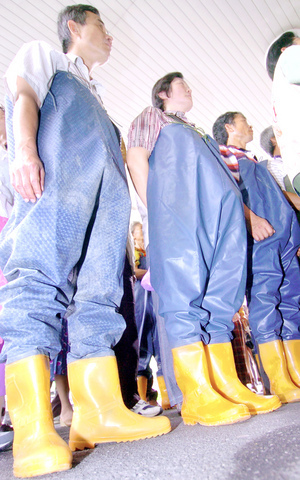Two special flood-control budget bills failed to clear the legislature yesterday due to confrontation between the pan-blue and the pan-green camps over procedures for reviewing the recall motion against the president.
Pan-blue legislators, who initiated the recall motion, came up with a version of the recall procedure, in which they demanded that the president or his representatives should attend the review meeting to give his response to the recall.
But pan-green legislators opposed the proposed procedure, arguing that there was no legal basis for either the president or his representatives to be required to attend the meeting.

PHOTO: CHEN TSE-MING, TAIPEI TIMES
The disagreement occupied the legislature for most of the day, even though cross-party negotiations on Thursday had specified that the two flood bills would receive due attention.
"Today's impasse proves that reviewing the budget bills was only an excuse the pan-blues used to convene a special legislative session," Democratic Progressive Party (DPP) caucus whip Chen Chin-jun (
The regulations governing recall of the president are specified in Article 44 of the Law Governing Legislators' Exercise of Power (
Pan-blue legislators said that the inadequacy of current recall regulations does not justify the DPP's refusal to negotiate an appropriate recall procedure.
"Since this is the first time the legislature is using its power to recall the president, we have to use this opportunity to establish constitutional precedents," Chinese Nationalist Party (KMT) Legislator Kao Su-po (高思博) said.
People First Party (PFP) Legislator Chang Hsien-yao (張顯耀) said the pan-blue camp would mobilize supporters to besiege the legislature next week if the pan-green camp did not accept their proposed recall procedure.
The flood-control budget bills include NT$30.9 billion (US$0.95 billion) earmarked for an eight-year "Flood-prone Area Management Plan," which is expected to reduce flooding risks in around half of the flood-prone areas around the nation. This directly affects 2.5 million people.
Another NT$14 billion has been earmarked to improve the Shihmen Reservoir, which has been plagued by turbidity problems that periodically leave millions of residents in Taoyuan County without water.
Yesterday, a group of farmers from Yunlin County carrying rotten vegetables destroyed by last week's flooding in southern Taiwan gathered in front of the legislature urging lawmakers to pass the budget bill.
"We left before 3am this morning. We have to make people and legislators living in Taipei understand the havoc that flooding has caused," a farmer said.
One farmer in the group was so angry about the pan-blue camp blocking the budget bills that he threw a pail of water at a KMT caucus member's staff.
Meanwhile, a group of environmentalists led by the Green Party also gathered in the legislature, voicing their opposition to the flood-control bills.
"The budget bill will not resolve the flooding problem completely as most of the budget will be used for constructing dams, protecting embankments and upgrading pumping stations, which will do more damage to the environment," the group's statement said.

An essay competition jointly organized by a local writing society and a publisher affiliated with the Chinese Communist Party (CCP) might have contravened the Act Governing Relations Between the People of the Taiwan Area and the Mainland Area (臺灣地區與大陸地區人民關係條例), the Mainland Affairs Council (MAC) said on Thursday. “In this case, the partner organization is clearly an agency under the CCP’s Fujian Provincial Committee,” MAC Deputy Minister and spokesperson Liang Wen-chieh (梁文傑) said at a news briefing in Taipei. “It also involves bringing Taiwanese students to China with all-expenses-paid arrangements to attend award ceremonies and camps,” Liang said. Those two “characteristics” are typically sufficient

A magnitude 5.9 earthquake that struck about 33km off the coast of Hualien City was the "main shock" in a series of quakes in the area, with aftershocks expected over the next three days, the Central Weather Administration (CWA) said yesterday. Prior to the magnitude 5.9 quake shaking most of Taiwan at 6:53pm yesterday, six other earthquakes stronger than a magnitude of 4, starting with a magnitude 5.5 quake at 6:09pm, occurred in the area. CWA Seismological Center Director Wu Chien-fu (吳健富) confirmed that the quakes were all part of the same series and that the magnitude 5.5 temblor was

The brilliant blue waters, thick foliage and bucolic atmosphere on this seemingly idyllic archipelago deep in the Pacific Ocean belie the key role it now plays in a titanic geopolitical struggle. Palau is again on the front line as China, and the US and its allies prepare their forces in an intensifying contest for control over the Asia-Pacific region. The democratic nation of just 17,000 people hosts US-controlled airstrips and soon-to-be-completed radar installations that the US military describes as “critical” to monitoring vast swathes of water and airspace. It is also a key piece of the second island chain, a string of

The Central Weather Administration has issued a heat alert for southeastern Taiwan, warning of temperatures as high as 36°C today, while alerting some coastal areas of strong winds later in the day. Kaohsiung’s Neimen District (內門) and Pingtung County’s Neipu Township (內埔) are under an orange heat alert, which warns of temperatures as high as 36°C for three consecutive days, the CWA said, citing southwest winds. The heat would also extend to Tainan’s Nansi (楠西) and Yujing (玉井) districts, as well as Pingtung’s Gaoshu (高樹), Yanpu (鹽埔) and Majia (瑪家) townships, it said, forecasting highs of up to 36°C in those areas